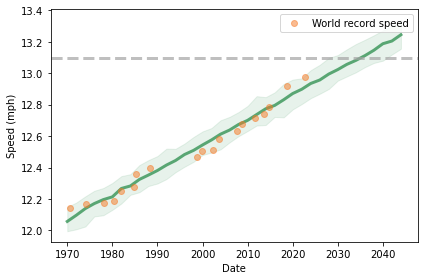On pace for 2-hour marathon in 2035
On September 25, 2022, Eliud Kipchoge ran the Berlin Marathon in 2:01:09, breaking his own world record by 30 seconds and taking another step in the progression toward a two-hour marathon.
In a previous article, I noted that the marathon record speed since 1970 has been progressing linearly over time, and I proposed a model that explains why we might expect it to continue. Based on a linear extrapolation of the data so far, I predicted that someone would break the two hour barrier in 2036, plus or minus five years.
Now it is time to update my predictions in light of the new record. The following figure shows the progression of world record speed since 1970 (orange dots), a linear fit to the data (green line) and a 90% predictive confidence interval (shaded area).

This model predicts that we will see a two-hour marathon in 2035 plus or minus 6 years. Since the last two points are above the long-term trend, we might expect to cross the finish line on the early end of that range.
This analysis is one of the examples in Chapter 17 of Think Bayes; you can read it here, or you can click here to run the code in a Colab notebook.
If you like this sort of thing, you will like my forthcoming book, called Probably Overthinking It, which is about using evidence and reason to answer questions and guide decision making. If you would like to get an occasional update about the book, please join my mailing list.